Since we planted squash very early this year (in order to get the plants established by the time June Gloom set in) we are already set to harvest some of our winter squash. Our Golden Pippin Acorn squash and most of our Delicata squash plants have withered, leaving behind golden fruits that will store through winter.
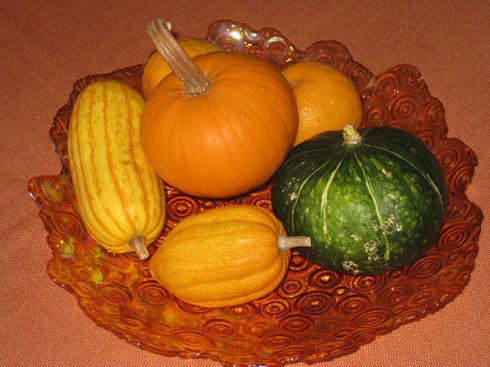
With pumpkins, it’s easy to know when to harvest – just let the vines turn brown and crispy, then pick your pumpkin. Not all winter squash is that simple. For example, I’ve been reading about gardeners who have picked acorn squash too soon and have reported that it taste horrible. There are a few tell-tale signs to help you make good harvesting decisions when picking Delicata and Acorn squash:
Thumbnail Test – Winter squash is ready to pick when the skins can not be pierced with your thumbnail. Summer squashes (like zucchini and yellow crookneck) will easily yield to a thumbnail, but winter squashes have a thicker skin, which makes them good for long storage.
Withered Vines – The vines and leaves on winter squash will turn brown and dry up, leaving behind a trail of squash that are still attached. The stems will break easily or crack if you try to lift the squash.
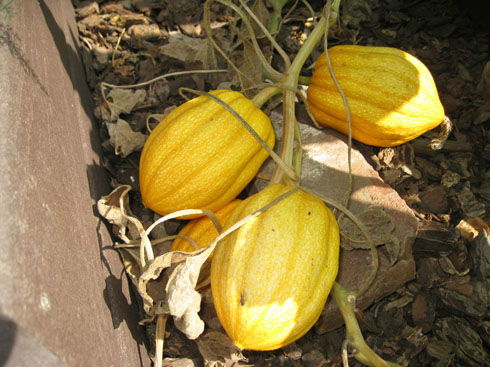
This Golden Pippin Acorn is not quite ready to harvest. Note there is still some yellow coloration to the stem.
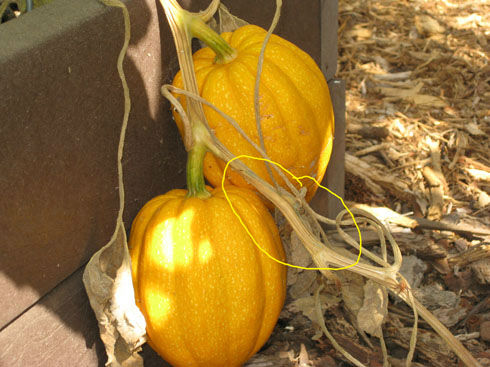
These acorn squash are basically ready to harvest, since the stem is dry, brown and withered. It will crack easily.
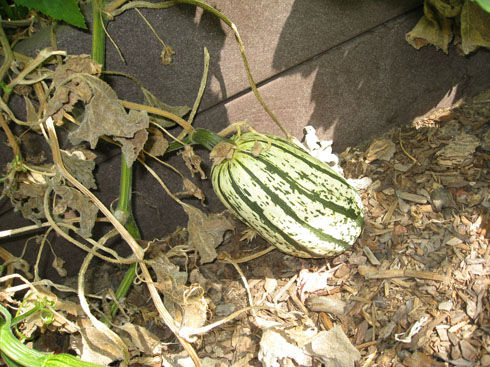
This Delicata still has some time to go, even though the leaves have died back. The stem is still green and the squash is bright. The cream color will change when it is ready.
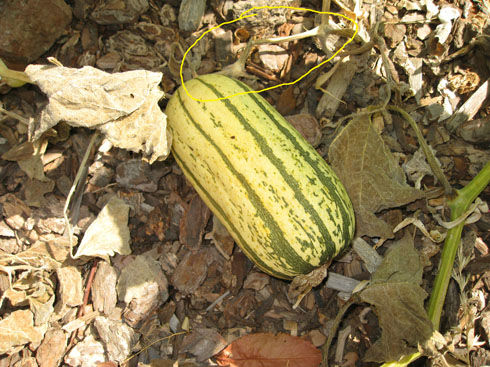
The yellow circle indicates dried vines – this squash is ready to pick. The background color has yellowed a little and orange flecks are seen in some places.
Harvesting tips: Cut squash with pruning sheers, leaving at least one inch of stem on them. This apparently increases their ability to store longer. Use any squash that show signs of cracking or softening right away, but if it’s too far gone, bury it or compost it, and you will likely get a surprise volunteer next spring.
One of the reasons why I grow Delicata squash is because it’s unusual looking. When ripe the cream background and deep green stripes will be tinged with orange. The other great thing about Delicata is that it can be eaten without peeling the skin. What a time-saver!
Note: Acorn squashes are usually green, so it’s easier to know when to harvest those – when the skin has turned deep green, and the underside has changed color from yellow to orange.
Curing: All winter squashes need to cure for a few days. You can cure your squash by leaving them in the sun for a few days, or bring them indoors and keep them in a warm area to allow the skin to harden further. After that, you can store them for months!
What’s your favorite squash to grow (and eat)? How is your squash doing this year? Share your experiences here.

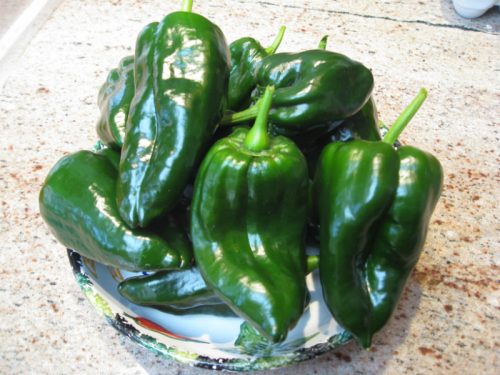

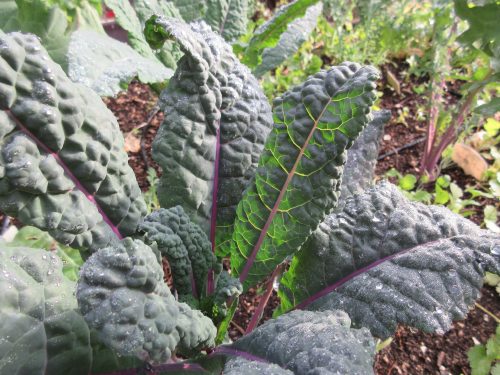
Thank you, this was very helpful! (even many years after the original post). My delicata squash vine was dying, and I was so concerned I did something wrong. Now I know I can leave it longer until it looks like the photo. Thanks so much.
You’re welcome! Glad you found this helpful.
Pingback: Cómo cultivar calabaza Delicata - Decoracion con plantas
Hi Christy-
Once you harvest the delicata is the plant done? Or is there a chance of producing again? Thanks!
Generally speaking, I wait to harvest until the vine dies back, and then yes, the plant is done. It’s an annual, so it won’t come back the next year, or continue producing.
I had so many early female blossoms and young delicatas growing on all my bush plants, but then all the small and new squash shriveled like raisins and went soft and squishy. All of the more mature squash seemed to avoid this fate and their vines are still dark green. Why did this happen? There was also powdery mildew on all the plants too.
Sorry to hear about the early pollination issues, Katherine. Usually male flowers open first, then the female flowers. Lack of phosphorus and potassium in the soil might account for the problem. Those two nutrients are responsible for boosting flowering and fruiting. Without proper pollination, the squashes will shrivel and die off. The older squashes will eventually turn color and it can happen all at once. Give it a little more time. As for powdery mildew, it is very common in coastal areas, and places with limited air circulation. Crowded beds, gardens with high hedges or walls or tall buildings close by can stagnate the air and allow powdery mildew to settle and take hold. I tend to cut off the affected leaves rather than use a fungicide (which kills beneficial fungi along with the bad). I’ve come to accept PM as an inevitability in my coastal garden and that makes my life a little easier. 🙂 Also, increasing soil biology (compost, compost tea, worm castings) will help balance over-productions of bad fungi.
I live in the pacific northwest with sun and warm/hot temperatures until early fall – THEN the rain snd cool temperatures arrive. My first-ever delicata squash are nearly ready for harvest, with still-green stems and quickly withering vines. I was wondering if light to moderate rain that lasts 4-7 days will harm the squash at this stage. Night time temps get down to 50-55 and daytime temps are about 60-70, but everything is always damp or wet.
Hi Mark, really good question. In climates where weather permits, it’s best to let winter squashes completely ripen in the field until the vines and stem are brown and dry. Given your situation, you’re weighing the options whether it’s better to leave them out or harvest them early. The answer I found comes from University of Mass. Amherst: “Ideally, pumpkins should be harvested when fully mature, with a deep orange color and hardened rind. However, as long as pumpkins have started to turn color, they will ripen off the vine if held under the proper conditions. While not ideal, this may be preferable to leaving them in the field if conditions are not favorable. If necessary, pumpkins can be ripened in a well-ventilated barn or greenhouse. The best temperatures for ripening are 80-85 degrees Fahrenheit with a relative humidity of 80-85%. Night temperatures should not drop below the sixties. Even if pumpkins are ripe, a period of curing can improve storage life. The curing period should be about 10 days. During this process, the fruit skin hardens, wounds heal and immature fruit ripens – all of which prolongs the storage life.
Pumpkins should be stored in a cool, dry place. Ideal temperatures are between 50° and 60° F and relative humidity of 50 – 70%.”
I hope this helps!
Thank you Christy. I’m much more confident about how to deal with the harvest as I keep a close eye on our fickle fall weather.
You’re welcome, Matk!
How late can you grow a second crop?
Marsha, it depends on when your first frost shows up. I just planted another crop of squash in my community garden, but we have another 3 months before fall gets here. In other climates fall arrives sooner and frost will wipe out crops. But if you choose varieties that will mature quickly or at least get to the point where they can be protected with a heavy garden fabric, you’ve got a chance for a second crop of squash this season.
Hi there! I just harvested a very large, very bumpy pale green delicata. It was getting so huge that I didn’t want to leave it on…I’ve never seen a delicata this big before. Any thoughts as to why it got so big without changing color? And will it still ripen after I’ve already harvested it?
Hi Lisa, Hmmmm… it’s hard to tell what’s going on there, but “bumpy and green” makes me think that the delicata seed may not have been true to type. You might have a rogue on your hands there. Winter squashes generally don’t continue ripening after harvest. In fact, if they are not fully ripe when harvested (with skin that cannot be pierced with a thumbnail) they may start to decay after harvesting. So you might want to use it up in the coming week or so before it starts to soften and decay. Most winter squashes can be enjoyed as immature fruit. They may not be as sweet as you’d like. Keep us posted.
Thanks Christy, That sounds like a logical explanation. I will try cooking it and see what it tastes like!
hi – thanks for the article! my delicata have not been ripening on the tree. one is actually turning a pastal green color it looks like. on another plants two squash next to each other are still pale but they dont have the cream color with dark green lines. the skin is hard and they i cannot pierce with a fingernail. do you think i should prune them now? both plants have not flowered either with the squash on them. im guessing all energy is going towards ripening them. thanks
Hi Jonnie, it is not uncommon for Delicata to be more even in color (no green) in home-grown situations. I have experienced that myself. The real test is the thumbnail, which your squashes seem to have passed. To be honest, I wait until the vines die back before harvesting all winter squashes (Delicata is a winter squash). That extra time in the garden means they will be cured well enough for storage since they have sat out in the sun a bit. So if you’re willing to wait, that’s best. If you want to harvest to eat now, go for it, since you can’t pierce the skin with a thumbnail.
This is my first year growing Delicata. I only planted one plant (started from seed) due to limited space. Here in the West Southwest of Georgia (USA), at the end of June, my plant has three squash and is still blooming profusely. Our temperatures are in the mid-upper 90’s with super high humidity. Even though we have had some rain, I have had to water this plant more than the other squashes and cucumbers; mid-day the leaves go limp but freshen up after a good watering with the sprinkler. We rarely have a killing frost, so I wondered if I could grow them in the fall (plant in September)? This article and the pictures are really helpful. Thanks!
Hi Deborah, Squash leaves will often go limp during mid-day but they perk back up in the afternoon. If they don’t do that, they need more water. You could try growing them in the fall, planting in early September as you suggested. I always say it’s worth trying to see if something works in your microclimate. Cooler temperatures tend to slow down growth of warm-season crops, but if you have heat through October, it could work.
Good article, the “not yet” and “ready” pictures are a great help.
I am growing delicata squash for the first time and wonder about what the stem should look like? They seem to be extremely dark (black!). Does that indicate a problem? Thanks for your info and pics above this – very helpful!
I see some images online that show Delicata squash vines being darker than other squash varieties. If they are growing, flowering, and setting fruit, and the leaves look healthy, I wouldn’t worry about it.
Thanks. I didn’t know when to pick my delicata but thanks to this info and photos I’m all set.
I forgot to mention I am growing delicate squash.
Based on the pictures and your descriptions, it sounds like it still has some more time to grow/ripen. My friend lifted one of my squash and broke half of the stem. Is that squash done for now? I am pretty devastated since I only had 2 squash on my entire plant.
HI Kelly, fear not, you can still eat delicata squash in its young stage. You’ll just want to eat it before it starts to decay. In many climates people have to pick squash early before frost hits. Delicata can be eaten as a summer squash (like zucchini) or left to ripen to a firm winter squash. Either way you can still eat it. So depending on how far along it is, you can leave it to ripen for awhile, or eat it before the skin starts to shrivel. Enjoy your squash and try again next year.
When I harvested my delicatas, I was impatient and twisted them off of the vine instead of pruning them off and leaving a bit of stem. Clear goo came out of the previously vine-attached end. Can my squash be saved? I’ll use the pruners next year!!
Hi Samantha, you can still eat them, but you will need to eat them sooner rather than later. Winter squashes are prone to decay if they don’t have an inch or so of stem left on the plant. Enjoy your delicatas before they start to get soft.
I am growing delicata squash and i have many on the vine. They got what I think is powdery mildew and all the leaves are dying. Once I realized what was happening I tried to get rid of the mildew with some cures i saw online, but no success. Can I still leave the squash on the vine to ripen? Anything else I can do?
Hi Abby, yes you can still leave the squash on the vine. Powdery mildew most often simply obscures the leaves from the ability to do that they do best – take in sunlight. So your fruit may be smaller, but they will still be edible. We usually cut off the affected leaves to help curtail the spread. There is also a product called Serenade, which is a bacterial spray (the bacteria eats the PM fungus) but it doesn’t make powdery mildew go away, it just prevents it from spreading and slows growth. This time of year, plants look pretty sad as the season comes to a close. Hang in there. Your squash will keep ripening even with fewer leaves.
Thanks Christy, this is very helpful. I didn’t know about Serenade. One more question – the vines that my squash are attached to are still green, but we are going to have some nights below freezing. Should I pick the squash or leave it out there until the vine turns brown? Thanks!
Can you cover it with a blanket or some thick mulch to stave off the frost? If not, I’ve been advised in the past that if you do have to pick early, just make sure to leave 2″ of stem on the pumpkin so it won’t decay. It should continue to mature without damage. Just keep an eye on it for soft spots and use it quickly if you start to see degradation.
I grow a lot of squash in Maine I always thought once you get powdery mildew you can’t stop it but I found something they say is organic and it seems to clear it out in about a day and a half barring rain. It’s called been oil I mix it every 15 days or so to do maintenance but it literally made the first mildew I saw this year actually dissapear . It also kills bugs I find it deters the border and kills potatoes beetles eggs as well as fighting many different fungi’s!. Was I lucky? I don’t really know but I do know I spotted a patch today while trying to train all the vines to do what I want ill spray tonight and try to send pics of before and after. It says it will remove it in 24 hours. With 1-2 ounces per gallon and a teaspoon of so of dawn unscented. As an imulsifier! Try it!
HI Mark, can you clarify what “been oil” is? Do you mean Neem oil? If so, neem is often used to treat insects and diseases and it is safe for organic agriculture. I still consider it a last resort because it can kill beneficial insects along with the bad guys. So use carefully.
I had a terrible problem with squash borers this year. My delicata vines died while the squash is yellow without the green stripes. As it fell off the vine I left it out to dry. Others are still on the vine but not maturing to the green stripes, will it be OK to eat?
Delicata is one of those squashes that you can eat young (before the skin hardens and develops stripes) or fully ripe. So give it a go and use it as you would a zucchini.
I was cleaning round the squash plot today and one of the delicata fell off its vine when I bumped it – It’s still green and cream-will it ripen and can I use it ?
I hate when that happens. It might be best to use it young and enjoy it more like a summer squash. It really depends how close it is to being ripe. If you can pierce the skin with your thumbnail, it may start to wither before it fully ripens to be good enough for storage. If your thumbnail doesn’t punch through the skin, try drying it down outdoors for a few days and see what happens.
I’m growing delicata for the first time
Several of the squash are already way too big but are still green and not ready for picking. What am I doing wrong? They are as big as a very large butternut squash. Help!
Pat, that sounds like a good problem to have. I’ve seen some delicata squash growing that large. Your soil must be in great shape. Just keep going and wait for the foliage to die back. Keep us posted on how they taste.
Wow! So glad I found you before harvesting my Winter Squash. As it is my first year growing any squash besides zucchini, I had NO idea I was supposed to leave the squash on the vine until the vine died back! I would have been out there in the next few days cutting off anything that looked ripe, and my vines are just as green as can be!
Thank You for saving me from unintentionally wiping out my entire Winter Squash production for the year. I’ll let you know how they (eventually) turn out.
Glad we could help!
I grew them for the first time this year. I have picked a few too soon. The flesh was still yellow and the seeds difficult to scrape out, but the flavor and texture are good. My vines are still green tells how early I am! I just couldn’t wait!
I grew delicata squash for the first time this year. I am wondering if I picked it too early or if I just had not let it cure yet. It did not have the right texture. I did the fingernail test but after reading above, the stems were still green although the vines were brown. I may have gotten ahead of myself, I was beginning to worry about the deer I have been seeing in my yard. I will try another one this weekend and hope for the best. I don’t think this is the right word but I would say around the seeds seemed mealy and when cooked, it never got soft (400 degrees for 40 minutes with some water on the pan. Any thought?
HI Sharon, that is unusual for Delicata to take longer than half an hour to cook through. Strange. Usually you let the vine die back completely before harvesting, which it sounds like you did. If the skin resisted puncture with the thumbnail test it was definitely done. Mealy texture could be a watering issue. I hope the other one is better. Keep us posted.
I’m a first time Delicata grower this year. I’m so glad I found your article on when to harvest them. I’ve noticed a boom in new growth this month. They are producing very well, and I don’t want to mess up the harvest. A friend from work told me about them , and I told him I would try growing them this season. I am so glad they are doing so well. I live in northeast Pa. and I set out the plants at the end of May. My plants are still green and there isn’t much sign of them dying back.
Congratulations, Annette. You’ll have squash soon. Dying back often happens all at once. So ride the wave and enjoy the green while you can.
Butternut are by far my favorite. I like to cube them in one inch cubes and fill a very large glass cake pan with them then take a pound of bacon and cut it into 1 inch chunks and sprinkle them all over the squash (maple is my favorite bacon to use). Then if that isn’t enough I put about a pound of butter spread out all over them. Lastly I place pork chops on top and bake them covered at 350-375 for about an hour or until the squash is soft. I uncover them and bake them at 400 for about 10 mins or until the pork starts to brown. People that say they hate squash I Halle he to try my squash and I’ve never heard anyone say they don’t love it.
Wow, Josh, that’s an amazingly decadent recipe. It sounds great, even though I’m a vegetarian. No wonder everyone loves your squash! Thanks for sharing your secret here.
I accidentally harvested a delicata squash before the vines died (clearly since it’s June…). Is there any way to ripen the squash so we can eat it? It’s a good size, but it’s still that creamy color. I’m so sad as I was SUPER excited about this squash:-(
Hi Katie,
Luckily, delicata is one of the squashes that can be eaten immature. Some winter squashes can cause stomach upset if eaten immature, but Delicata should be okay. It may not be as sweet as when mature, but you can use it as you would any squash and enjoy it now. Unlike tomatoes, which you can wrap in newspaper to continue ripening, squash will not do that.
I planted delicata squash in my compost heap this year since I didn’t have room for it in my small veggie garden. The delicata skin is hard but the plant vines still are plump and green. Should I harvest it now or wait until the vines are dry and withered?
Wait until the vines die back to harvest. It shouldn’t be long now.
If picked too soon, they are bland and not nearly as sweet; I just made that mistake. When I intend to cook them, I cut them in half, scoop out the seeds, and place them face down in a pan with a little water at about 375 degrees. After about 45 minutes ( or when a knife will pierce the skin easily) I turn them over and add butter and sometimes a little brown sugar. (Personally, I don’t think it needs it). Good luck!
I agree. Squashes don’t need sugar. Nor do sweet potatoes, in my book. Maybe I’m just weird, but I like savory over sweet any day.
Thanks for the insight on the delicata’s. They are my wife’s favorites thus I’m growing them this year. I’ve got a doz or so and she’s so damn excited, I didn’t want her hopes dashed in not harvesting them correctly. Thanks.
My rouge de tampfs are looking beautiful too!!
I purchased several acorn squash for our Christmas dinner. Baked it at 350 degrees in a pan with some water added and covered with foil. After almost 2 hr. it was still too hard to serve. I also baked some scalloped potatoes at the same time, so I know my oven was working properly. Could these squash been picked too soon and not ripe enough to eat? Thank you for taking the time with my concern.
HI Mary,
It sounds like you did everything right, and given that you also cooked something else in the oven at the same time, we can rule out your oven as the problem. I think it’s possible that the squash was not ripe when picked. I haven’t encountered this problem before, nor could I find any supporting info on the web when I did some research. So it’s a bit of a mystery to me. If any fellow Gardenerds have insight, please post your ideas.
We have couple Delicata’s given to us from a local, and were wondering if the seeds would volunteer over the winter in the compost. If so; should I separate them for easier identification in the spring?
Thanks,
Tony
Hi Tony,
So many people have success growing bountiful squashes from their compost pile. If you have a covered pile, the seedlings will germinate, but get long and leggy (not good). If you have an open pile you can expect plants to thrive. You may want to plant those seeds in early spring in your compost pile off to one side, or throw caution to the wind and throw them in there now. It all depends on where you live. Here in Los Angeles, we don’t get a frost, so seeds would germinate over winter, but it wouldn’t be hot enough for the plant to thrive. In places with snow, the seeds would lie dormant over winter, then spring to life in spring. You choose, and have fun with it!
My acorn squash look like they may be over done. The vines are Brown but the stems are as well. Are they still good to eat?
Most winter squash (acorn and other types that have a thick skin that can’t be punctured with a fingernail) usually are ready when the vine dies back and the stem dries out. So you’re fine. Cut the vine off leaving a few inches of stem (they store better that way), and enjoy!
Thanks! I picked them all last night. Four plants gave me 12 acorn.
Have never grown delicata squash before and your information is so, so helpful, especially the pictures of ripe and unripe. Thanks!
First time Delicata squash growers here….. and we have a bumper crop! thanks for the info on when and how to harvest.
Yay, Kathy! Congrats. I’m glad your Delicata plants did well. Mine failed this year. 🙁 Oh well, next time!
Just picked a dozen following your article. Thanks for your help.
YAY! Glad we could help.
I read (because you know if it’s on the internet, it must be true) that most winter squash should be left to cure, except for Acorn Squash (from organicgardening.com ” (Skip the curing step for acorn squash, which can become stringy if it’s not moved to a cool place immediately after harvest.) “). I don’t know if that’s true, as they say, “YMMV” 🙂 Thanks for the helpful tips about making sure the vines die down, not just the leaves.
Wow – I loved the pics of how the Delicata look as they ripen. I am new at this, and didn’t realize you needed to let the vines die down. I also didn’t know about leaving some of the stem attached, nor that they should be left to cure. I can’t thank you enough!!
You’re very welcome, Beverly. I’m glad you found it helpful. Keep up the good work and experiment. That’s what gardening is all about.
Thanks for the information. This is the first website I have found to be trully informative. I had a lot of questions about Delicata and Pink Banana since it is the first time I’m growing them. This has helped a lot.
Excellent. Glad to have helped to solve the mystery.
Thanks! your picture shows my squash which grew from seed that I bought as cukes or zucchini. I’ve been trying to find out what it is – delicata squash!
Thanks again!